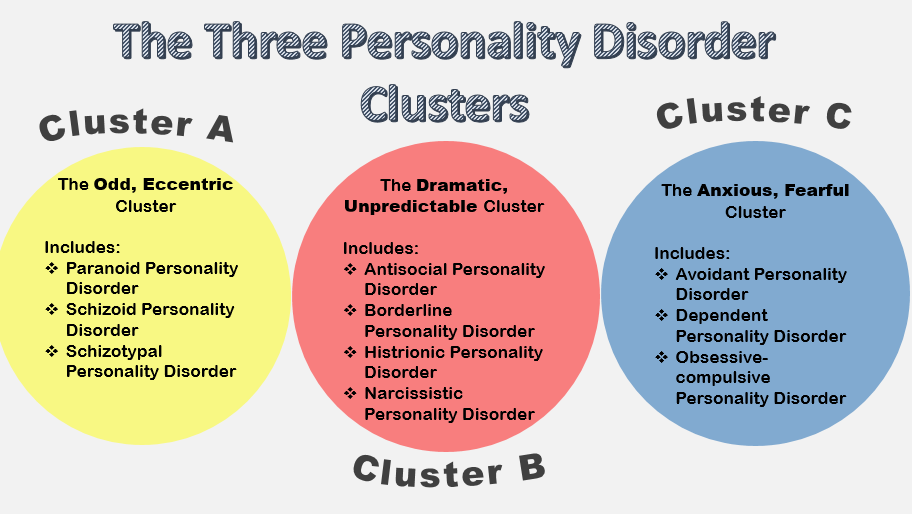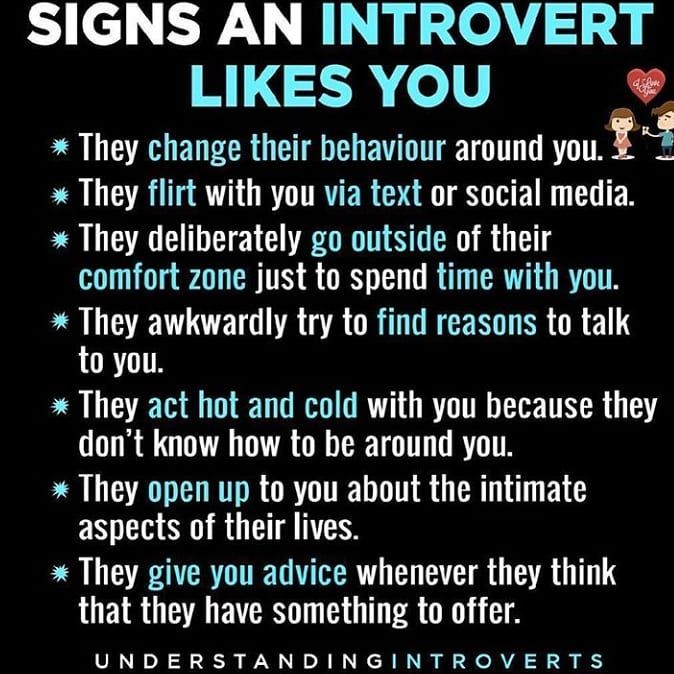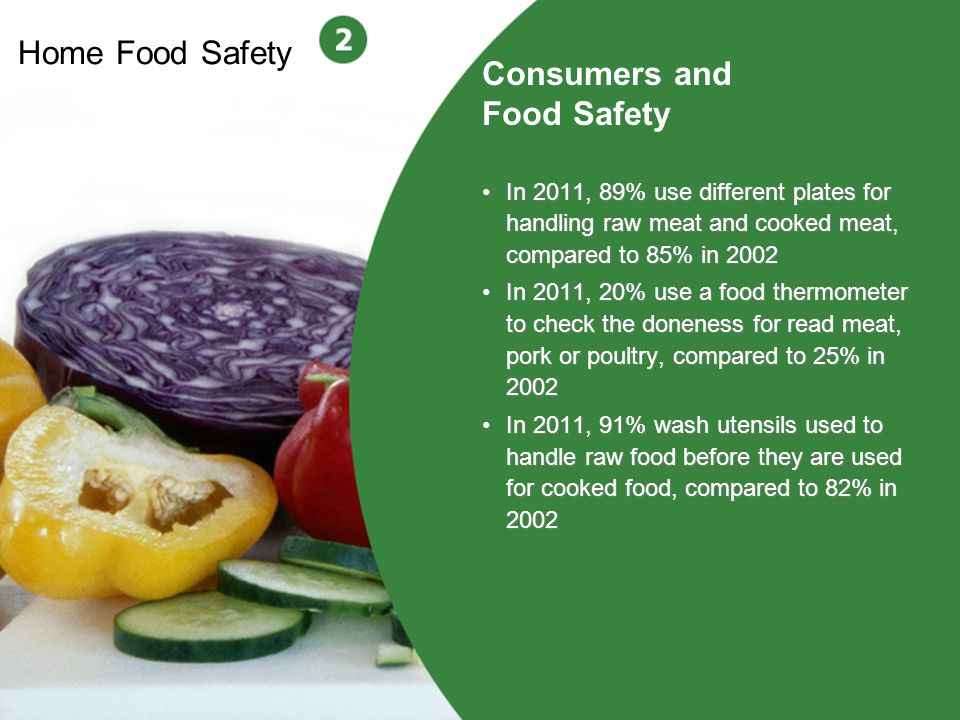Bpd and narcissistic couple
Understanding the Dynamic in BPD/NPD Relationships
There’s no denying that Borderline Personality Disorder (BPD) and Narcissistic Personality Disorder (NPD) can appear similar to the outside observer. Both are characterised by difficult interpersonal relationships and the need for external gratification. However, when we look a bit more closely, both conditions have unique symptoms and causative factors. Despite this, it’s not uncommon for people with BPD and NPD to end up in relationships.
This article will explore both conditions, examine the potential environmental causes, discuss why they can be drawn together, and what can happen when they do. It’s important to remember each person, their condition, and their relationship is unique – this article is a broad overview.
Understanding Borderline Personality Disorder
The DSM -1V defines Borderline Personality Disorder (BPD) as a ‘pervasive pattern of instability of interpersonal relationships, self-image and affects and marked impulsivity’. Some of the more common symptoms include:
- Dysfunctional interpersonal relationships
- Instability in mood
- Dysphoria
- Self-injurious behaviour
- Fear of abandonment
- Maladaptive coping behaviours[1]
- Impaired occupational functioning[2]
One of the easiest ways of understanding BPD is to consider people with the condition as having difficulty returning to their emotional baseline.
While people without BPD might see something that annoys them, get slightly angry about it, and move past it, this could provoke a huge, long-lasting emotional reaction in those with BPD. In the same way, if something good happens, people with BPD might feel ecstatically happy for much longer than someone else might. To friends, families, and loved ones, these huge emotional peaks and troughs can be difficult to deal with and cause relationship problems.
The precise cause of BPD is still a grey area – like many mental health conditions, it’s thought that it can arise from a combination of historical, genetic, and environmental factors, including:
- Childhood abuse (in particular, severe and sustained abuse)[3]
- Neglect
- Genetics
- Separation from loved ones
Understanding Narcissistic Personality Disorder
According to research, narcissism usually starts to develop at around the ages of seven or eight – at the time when we start to assess ourselves based on our perception of others.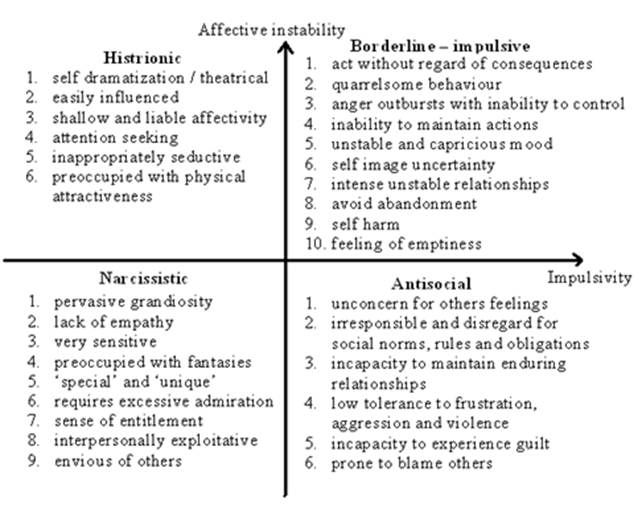 The core belief of all narcissism is the belief that the person with the condition is somehow superior to others.
The core belief of all narcissism is the belief that the person with the condition is somehow superior to others.
Narcissism is thought to be caused by a combination of genetic and environmental factors. If we’re brought up with parents that over-exaggerate our good qualities and achievements while only superficially engaging with us, it puts us at risk of developing Narcissistic Personality Disorder (NPD). On one level, we’re being told that we’re better than other people, while on another, we’re getting the conflicted message that we’re not worth having a meaningful relationship with.
It’s thought that narcissism occurs on a spectrum – people can have narcissistic traits or be clinically diagnosed with Narcissistic Personality Disorder. Common symptoms of the latter are:
- Being self-centred
- Feelings of grandiosity
- Being willing to exploit others to get what they want
- An overwhelming need to be admired
- A severe lack of empathy
- A desire for control[4]
What Happens in a Relationship Between Someone With BPD and Someone With NPD?
Relationships between people with BPD and NPD can help each party fulfil their needs – albeit in an unhealthy manner. For the BPD sufferer, they see everything they can’t do in the narcissist – it’s someone who appears confident and self-assured. They can feel like the perfect counterbalance to their own insecurities, and this is amplified by the emotional dysregulation of BPD.
For the BPD sufferer, they see everything they can’t do in the narcissist – it’s someone who appears confident and self-assured. They can feel like the perfect counterbalance to their own insecurities, and this is amplified by the emotional dysregulation of BPD.
When the person with NPD meets someone with BPD, they can tend to use them to fulfil their need for validation, often at the expense of the BPD sufferer’s boundaries and feelings. This insatiable need for attention coupled with the heightened emotions of BPD to make a volatile mix. If the person with NPD’s needs aren’t met, they can often turn cold and distant, shunning the person with BPD and triggering their fear of abandonment.
However, the party with BPD isn’t always the victim. In certain instances, their extreme behaviour can push the person with NPD so far that they decide to move on and get their needs met by someone else. If the person with BPD pursues them after this, it can play into the person with NPD’s desire for attention and control.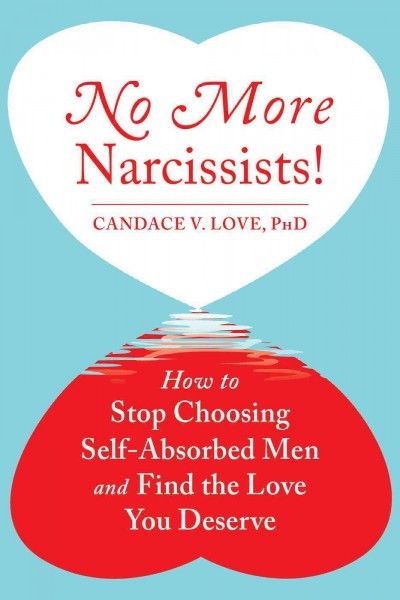
Point To Remember
It’s important to remember that although the behaviours of both parties in this relationship have the capacity to cause pain and discomfort, it’s not done with malice. As distasteful as they may seem, they’re simply pursuing a maladaptive approach (often learned in childhood)[5] to get their needs met.
However, in the context of a BPD/NPD relationship, these issues are not resolved by following the same patterns – they need to be addressed in trauma-informed therapy. By breaking the cycle with therapeutic intervention, it can prevent children from growing up in chaotic environments and potentially learning those maladaptive coping strategies.
If you have a client or know of someone struggling to heal from psychological trauma, reach out to us at Khiron Clinics. We believe that we can improve therapeutic outcomes and avoid misdiagnosis by providing an effective residential program and outpatient therapies addressing underlying psychological trauma. Allow us to help you find the path to realistic, long-lasting recovery. For more information, call us today. UK: 020 3811 2575 (24 hours). USA: (866) 801 6184 (24 hours).
Allow us to help you find the path to realistic, long-lasting recovery. For more information, call us today. UK: 020 3811 2575 (24 hours). USA: (866) 801 6184 (24 hours).
Sources:
[1] Antai-Otong, Deborah. “Treatment considerations for the patient with borderline personality disorder.” The Nursing clinics of North America vol. 38,1 (2003): 101-9. doi:10.1016/s0029-6465(02)00063-4
[2] Zanarini, M C et al. “Axis I comorbidity of borderline personality disorder.” The American journal of psychiatry vol. 155,12 (1998): 1733-9. doi:10.1176/ajp.155.12.1733
[3] Lieb, Klaus et al. “Borderline personality disorder.” Lancet (London, England) vol. 364,9432 (2004): 453-61. doi:10.1016/S0140-6736(04)16770-6
[4] Cooper, Luke D et al. “Self- and informant-reported perspectives on symptoms of narcissistic personality disorder.” Personality disorders vol. 3,2 (2012): 140-54. doi:10.1037/a0026576
[5] Lachkar, Joan.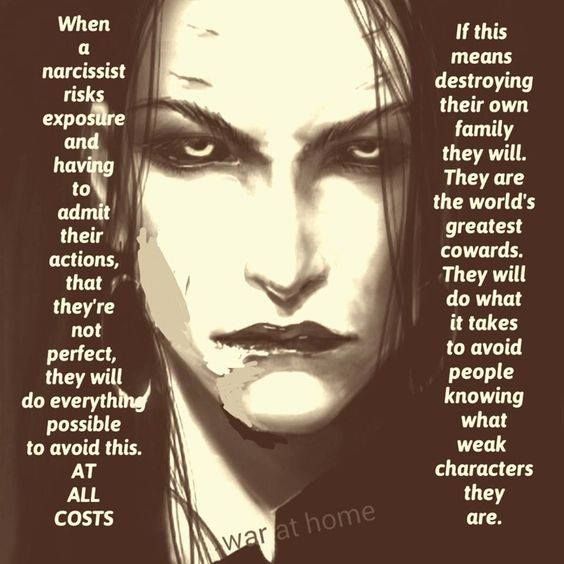 The Narcissistic/Borderline Couple. 2nd ed., Brunner-Routledge, 2004.
The Narcissistic/Borderline Couple. 2nd ed., Brunner-Routledge, 2004.
Why Do Narcissists and Borderlines Fall in Love?
Source: photo by Andrii Nikolaienko Pexels
Here is something that most people do not know. After spending the last 40 plus years listening to my clients talk about their love lives, I realized an interesting fact:
Most people choose romantic partners who are their approximate equals with regard to understanding how to sustain intimacy.
This is similar to what went on when we were in elementary school. The teachers sorted us into reading groups. Everyone in the “Chickadees,” for example, could read at about the same level. Not everyone in the group had the exact same problems with reading, but everyone was more-or-less at the same level with regard to reading skills.
Intimacy Skill Groups: Relationships require skills as well, such as learning how to negotiate differences, communicate, forgive each other after fighting, and so on. I think of these as our “Intimacy Skill” set. I have found that people tend to unconsciously sort themselves into groups with regard to their level of intimacy skills. Very few people choose partners that are more than a half step above or below them with regard to their ability to maintain a successful relationship. If someone is too far above us in their grasp of Intimacy skills, they are likely to find us boring and difficult. If they are too far below us, we are likely to be uninterested in them for the same reasons.
I think of these as our “Intimacy Skill” set. I have found that people tend to unconsciously sort themselves into groups with regard to their level of intimacy skills. Very few people choose partners that are more than a half step above or below them with regard to their ability to maintain a successful relationship. If someone is too far above us in their grasp of Intimacy skills, they are likely to find us boring and difficult. If they are too far below us, we are likely to be uninterested in them for the same reasons.
Individuals with Borderline and Narcissistic Disorders share some of the same intimacy issues
- People in both of these groups lack what psychotherapists call “Whole Object Relations” and “Object Constancy.”
Whole Object Relations: “Whole object relations” is the capacity to simultaneously see both the good and bad qualities of a person and accept that both exist. This capacity is normally developed during early childhood through copying your parents and, most importantly, through being seen realistically and accepted and loved for who you are by your parents, despite your imperfections. This capacity can be acquired later if the person is sufficiently motivated and has appropriate psychotherapy.
This capacity can be acquired later if the person is sufficiently motivated and has appropriate psychotherapy.
Without “whole object relations,” people alternate between two equally extreme and unrealistic views of themselves and other people: either they are “all-good” or “all-bad.” Instead of integrating these views when they see something that makes it clear that the other person is not all-good, they simply switch to seeing the person as all-bad—and vice versa.
In both cases, they also temporarily forget all the past history associated with the side that is now out of awareness. Therefore, if they are seeing you as “all-good,” they only remember things that support that view. When they are seeing you as “all-bad,” they only remember the things that support that view. As both of these views are overly extreme and inaccurate, they are inherently unstable and sometimes can rapidly shift back and forth in the course of a day.
Object Constancy: “Object Constancy" has two basic parts:
- The ability to maintain one’s positive feelings for someone while one is feeling hurt, disappointed, frustrated, or angry with the person.

- The ability to maintain a sense of emotional connection to someone who is no longer present. This includes the ability to recall his or her face and other significant features that you associate with the person. Without this, the person is literally: Out of sight and out of mind.
The lack of “object constancy” is a consequence of not having “whole object relations.”
- Whole Object Relations and Object Constancy can be thought of as Intimacy Skills
According to the Object Relations school of thought about personality disorders, the lack of “whole object relations” and the lack of “object constancy” are the defining features of all personality disorders. This means that the lack of both is a defining feature of the current intimacy skill group of people with personality disorders. This mutual lack of “whole object relations” and “object constancy” actually increases the likelihood that two people who each have a personality disorder (including someone with a Narcissistic adaptation and someone with a Borderline adaptation) will fall in love with each other, and makes it less likely that either will fall in love with someone without a personality disorder – all other things being equal.
NOTE: In this article I am using the terms “Borderline” and “Narcissist” as shorthand for people who have made specific types of adaptations to their early home environments that persisted into adulthood as a series of thought patterns, behaviors, and life strategies that are commonly referred to as Borderline Personality Disorder and Narcissistic Personality Disorder. No disrespect is intended. In my opinion, people are not Borderlines or Narcissists; this is the name for their current pattern of being in relationships and their approach to life.
- Narcissists and Borderlines Form Intense, Quick Attachments
Narcissists and Borderline individuals also have something else in common that makes them likely to choose each other: they both can quickly form intense romantic attachments based on very little information about the other person. Most people who do not have either a Borderline or Narcissistic adaptation tend to take their time when making the decision whether their new lover is “the one.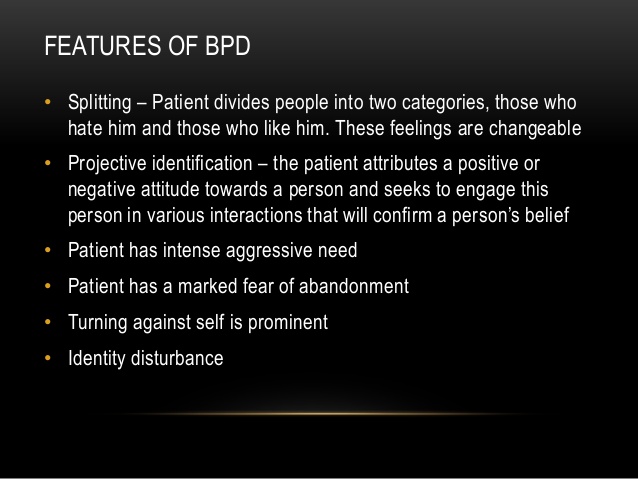 ” My Borderline and Narcissistic clients often bond instantly when they barely know each other.
” My Borderline and Narcissistic clients often bond instantly when they barely know each other.
They tend to do this for different reasons:
The Borderline Reason: Many people with Borderline adaptations live for love. They use connecting to someone as a remedy for feelings of emptiness, restlessness, and loneliness. They are what I think of as “Clingers.” They form quick strong attachments and resist any information that suggests that they should detach because this person is an inappropriate mate. The idea of detaching brings up their underlying fears of abandonment, so they find reasons not to leave.
When things get bad, as they often do when a Borderline marries a Narcissist, it is the Borderline mate that usually has the most trouble detaching from the relationship. This is because they are terribly conflicted: One side of them is quite rational and knows that the relationship is not working and that they should leave, while the other side is very fearful of taking the step of leaving because it means that they will be on their own again. Many people with BPD feel inadequate to deal with everyday adult life and being with someone – almost anyone – can feel more secure than being on their own.
Many people with BPD feel inadequate to deal with everyday adult life and being with someone – almost anyone – can feel more secure than being on their own.
Example: Maria, Benny, and the Bridge
Maria is a rather submissive Borderline woman who suffers from severe anxiety. She tends to develop phobias that limit how far from home she can go without her husband Benny. Benny is a verbally abusive, controlling Narcissist who likes that Maria is so dependent on him.
Maria entered therapy with the specific goal of finding the strength within herself to leave Bennie. She complained that Bennie was harsh, controlling, and emotionally unavailable. They had very little in common except the functions that they fulfilled for each other. Benny tolerated her fears and weaknesses because he enjoyed being the strong one. It fed his self-esteem. Maria tolerated Benny’s controlling ways because she felt inadequate to mold her own life. As long as Bennie made all the decisions, she was free to be as helpless and dependent as she liked. Maria said in her first session that she no longer wanted this type of relationship. She could imagine something better for herself with a man who was kinder and less critical.
Maria said in her first session that she no longer wanted this type of relationship. She could imagine something better for herself with a man who was kinder and less critical.
All went fine for a couple of sessions. Then just when Maria was formulating a realistic plan for leaving, she suddenly developed a fear of driving across bridges without someone in the car with her. The more afraid she became, the more she clung to Benny. Her fear of crossing bridges on her own was a metaphor for Maria’s whole life. Self-activating and deciding to leave Benny was the equivalent of crossing the bridge by herself. As Maria’s plan to leave became more and more real, her underlying feelings of inadequacy and the subliminal memories of early abandonment and a deep need for attachment started to surface and manifested as this phobia. The phobia made her more dependent on Bennie than ever, for he was the “driver” in her life. Maria and I quickly realized that she would need her therapy to refocus now on these old re-emerging issues if she ever wanted to be able to be on her own and take charge of her own life.
The Narcissist Reason: Narcissists choose their lovers based on whether the person enhances their self-esteem. As their need for self-esteem enhancement is ongoing, they have no incentive to wait to get to know the person better. The things that attract Narcissists are not the enduring personal qualities of the other person or even compatibility. As long as the person has high status in their eyes and they find the person appealing, they are usually willing to go full speed ahead with the relationship. Unfortunately, as their real interest in the person is exactly this shallow, they often leave the relationship just as suddenly as they began it.
- Narcissists and Borderlines want different things from a relationship
Narcissistic and Borderline individuals can fall in love, but they are likely to expect such very different things out of the relationship that the relationship is unlikely to be successful for very long.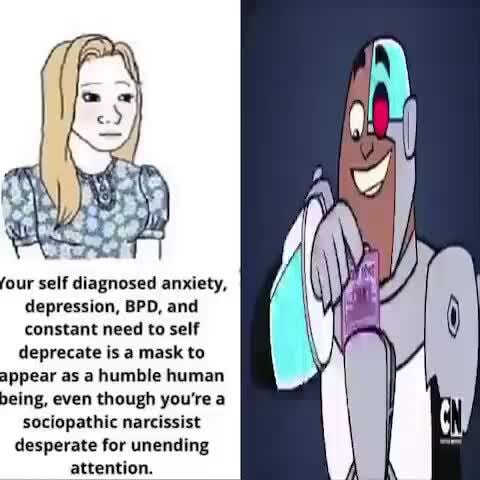
Narcissists want continuous self-esteem enhancement – Borderlines want continuous, unconditional love
Narcissistic individuals want their mate to enhance their sense of self-esteem, while Borderline individuals want continual reassurance that they are loved. Both sets of needs may be fulfilled in the early honeymoon stage of the relationship, but are less and less likely to be satisfied as they become more accustomed to being with each other.
Example—Artie and Jane
Artie, an Exhibitionist Narcissist from a working-class background, was immediately attracted to Jane, a high functioning very sexy Borderline woman from a wealthy family. He idealized Jane and believed that being in a relationship with someone so perfect would be heaven.
He pursued Jane for months, showering her with gifts, romantic dinners, and continually professing his complete devotion and love for her.
Jane was more insecure than she appeared and loved that Artie was so demonstrative and vocal about his love for her. The sex was great because he was eager to please her and he seemed to be able to anticipate exactly what she would enjoy without her having to say a word.
The sex was great because he was eager to please her and he seemed to be able to anticipate exactly what she would enjoy without her having to say a word.
They were both blissfully happy for the first few months that they were together. Then, as time went on, they got to know each other better.
Now that Artie felt that he “had” Jane, he started to be less concerned about proving his devotion. He also began to notice that Jane was not the flawless, perfect woman he first assumed that she was. As Artie is a Narcissist, seeing Jane’s flaws caused him to stop idealizing her. This led him to become more careless around her, less overtly loving, and he started to mention things that he wanted her to do for him – like doing his laundry and shopping for groceries.
Jane started to feel angry, insecure, and unloved as Artie’s overt demonstrations of his love for her diminished and his demands increased. She alternated between clinging to Artie and asking for hugs and reassurance of his love and angrily withdrawing.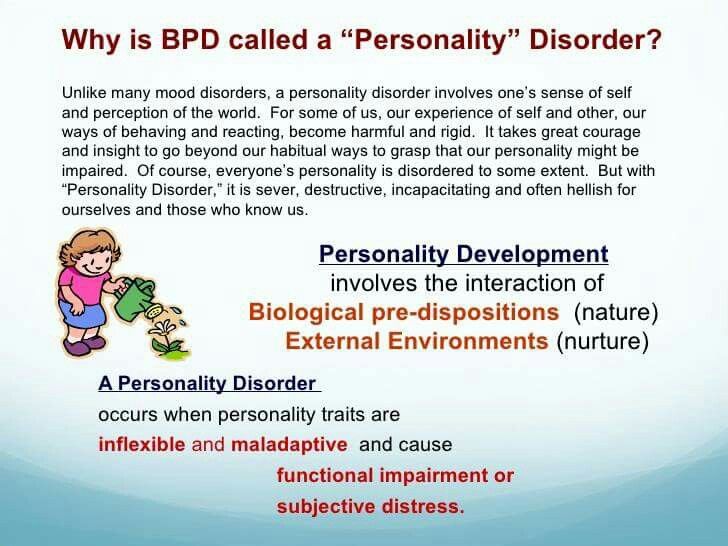 She started to flirt with other men in Artie’s presence in the hope that making him jealous would cause him to become more loving.
She started to flirt with other men in Artie’s presence in the hope that making him jealous would cause him to become more loving.
Artie felt annoyed when Jane got clingy and insecure, and furious when she flirted with other men. Neither had the relationship skills to calmly talk to this out. Instead, the mutual disappointment caused them to treat each other badly and their fights escalated. Needless to say, the relationship soon came to an ugly end with each of them blaming the other for everything that went wrong.
Punchline: Borderline and Narcissistic individuals often fall in love because they are at approximately the same level with regard to their “Intimacy Skills.” They both are likely to be in the early stages of learning how to successfully maintain intimate relationships. In the beginning, everything may seem blissful because they both share the capacity for making fast, intense romantic attachments without looking very closely at the other person’s real personality.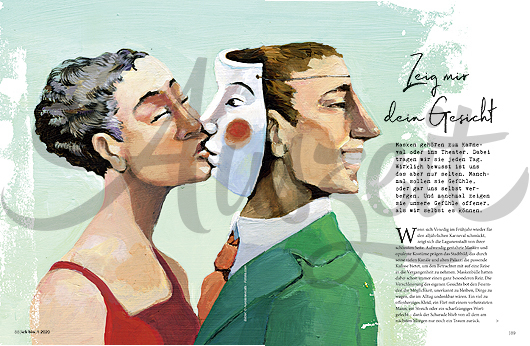 They are both likely to believe that they will get exactly what they have been longing for from their new romantic partner. Each sees the other as a dream come true.
They are both likely to believe that they will get exactly what they have been longing for from their new romantic partner. Each sees the other as a dream come true.
Unfortunately, as the relationship progresses, their basic differences in how they approach life and what they want from each other and their lack of “whole object relations” and “object constancy,” make their relationship inherently unstable and unlikely to last. There is an old saying that applies here: A bird and a fish can fall in love, but how will they make a life together?
Psychopaths or victims: who are the "border guards"?
Borderline personality disorder (BPD) has recently been quite heatedly discussed in the media and social networks, but expert opinions about what it really is are often diametrically opposed.
According to some experts, BPD is a relatively new and rather complex phenomenon in psychopathology, according to others, we are talking about the good old and well-studied psychopaths described in the book “Clinic of Psychopathies , their statics , dynamics , systematics” back in 1933 by psychiatrist P. B. Gannushkin. One way or another, according to experts, there are quite a lot of "border guards" around, and therefore it is worth taking a closer look at them.
B. Gannushkin. One way or another, according to experts, there are quite a lot of "border guards" around, and therefore it is worth taking a closer look at them.
"Dangerous, but sane"
According to ICD-10 (International Classification of Diseases), this condition is a subtype of emotionally unstable personality disorder, which is divided into two types: impulsive ("impulsive personality disorder", formerly known as explosive psychopathy) and borderline (“borderline personality disorder”). The first type is characterized by emotional imbalance, lack of restraint, impulsiveness, low self-control, aggressiveness. The second, in addition to all of the above, is characterized by high anxiety and a strong level of desocialization. People with BPD often lead antisocial and risky lifestyles, feel empty, and abuse psychoactive substances.
P psychotherapist, member of the Russian Academy of Medical and Technical Sciences Alexander Tesler explains: this condition was renamed from psychopathy to a personality disorder purely out of political correctness. According to one version, this condition is congenital, according to another, it is acquired. As the MIR 24 expert stated, psychopathic traits can either be aggravated by upbringing or compensated, but psychopaths are still born.
According to one version, this condition is congenital, according to another, it is acquired. As the MIR 24 expert stated, psychopathic traits can either be aggravated by upbringing or compensated, but psychopaths are still born.
However, if earlier psychopathy was really explained mainly by bad heredity or birth trauma, today the versions have varied and range from genetic predisposition to experienced psychotraumas, including mental, physical and sexual abuse in childhood.
In fairness, it should be noted that in general human nature is distinguished by an enviable variety of various personality disorders that are not a disease in the full sense of the word. In ICD-10, their spectrum is listed in section F60-F68. This is antisocial personality disorder, and hysterical, and anancaste, and anxiety, and many others. There is dependent personality disorder and permanent change after experiencing a catastrophe. Separate points are disorders of habits and inclinations (for example, a pathological attraction to gambling - gambling addiction), to theft (kleptomania), etc. Gender identity disorders are also listed there - transsexualism, dual role transvestism, gender identity disorder in childhood, sexual preference disorders (fetishism, exhibitionism, voyeurism, etc.).
Gender identity disorders are also listed there - transsexualism, dual role transvestism, gender identity disorder in childhood, sexual preference disorders (fetishism, exhibitionism, voyeurism, etc.).
Usually personality disorders are not strictly described paranoid, schizoid, asthenic conditions, but a kind of mosaic. There is even the term "mosaic psychopathy" (mosaic personality disorder). These properties, which in a calm state are compensated by some kind of brakes, are borderline, but stress can unsettle them, says Tesler. Decompensation - the removal of inhibitory mechanisms - exacerbates all these specific features, and then the line is left behind, and the person turns into a psychopath.
“Everyone in one way or another has both traits – hysterical, asocial, and anxious. We are all mosaic, so pure psychopathy is difficult to identify. It's just that there are prevailing character traits, and there are secondary ones. But during the period of exacerbation, a person does not fully interact with the outside world, society, law, himself, can become aggressive or immerse himself in himself, interrupt contacts with society.
In forensic psychiatric practice, people with personality disorders, if they were not in a state of passion, are recognized as sane, i.e. responsible for their actions,” explains the doctor.
At the same time, other researchers believe that for psychopaths, "border guards" are too well adapted to reality. However, they certainly have serious problems. Psychoanalyst Adolf Stern, who first used the term "borderline" in 1938, noted that this condition may include narcissism (simultaneous idealization and humiliation of significant persons), impotence in crisis situations, a heightened reaction to criticism, melancholy or infantile personality type, masochism, often accompanied by deep depression, inability to endure severe stress.
Other researchers have observed "border guards" chronic feeling of inner emptiness, inertness of affect (stability, sticking of emotions), inability to endure monotony and constancy, tendency to break traditional social rules, lateness, difficulty in establishing emotional contacts, outbursts of rage, irresponsibility, excitability, parasitism, bouts of depression, anger as the predominant or only type of affect, emotional vulnerability, a tendency to impose unrealistically high standards and expectations on oneself.
Another problem of the “borderguard” is a disorder of self-perception, difficulties in understanding oneself and the boundaries of internal and external reality. “Individuals with BPD often claim that they do not feel their “I” at all, complain of a feeling of emptiness and do not know who they are,” writes psychologist Ekaterina Tarasova.
The psychoanalyst Otto Kernberg pointed out that the borderline personality does not feel continuous. A person does not clearly feel who he is, he can evaluate himself in completely different ways in different situations, and because of this fuzzy “I”, he is forced to defend himself, explains psychiatrist Natalia Stilson. “I” in the past, present and future of the “border guards” are not connected, therefore, in a fit of anger, they can completely lose the feeling of love for someone - the connection with past positive experiences is lost. And a fit of anger in a “border guard” can provoke even the most insignificant episode: “I didn’t give you candy - it’s bad. ”
”
BPD is sometimes associated with Bipolar Affective Personality Disorder (BAD), which involves fluctuations from depression to hypomania. BAD used to be called manic-depressive psychosis. However, most researchers argue that “border guards” are another story.
Idealization and devaluation
As clinical observations show, since “borderguards” are poorly aware of themselves, they like to unconsciously “mirror” a partner, assimilating his traits, interests, views and parts of personality. But then comes disappointment in the "borrowed", and, as a result, aggression directed at the donor of these parts.
At first, a highly functioning “border guard” can make a good impression on others, until he becomes disillusioned with them and falls into a phase of aggressive rejection of alien “parts”. “The mental life of BPD is a stormy sea with its own laws. So don't give yourself up to the waves. Not even all good swimmers can cope with this,” Natalia Stilson warns potential partners of the “border guards”.
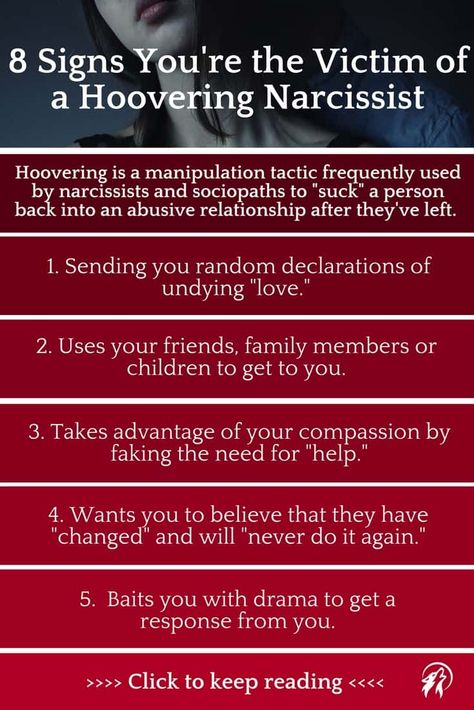
In his relations with others, the "border guard" goes through several phases: idealization, disappointment and depreciation. Therefore, partners he, as a rule, come across appropriate.
As Stilson points out, the typical partner of the "border guard" is the narcissist. The latter needs a "reflector" of his own false personality, while the former wants to appropriate other people's good qualities and parts. “The narcissist exposes his vivid false personality, which the border guard reflects and appropriates,” writes the psychiatrist. "So which one of them is in trouble?" Narcissus. But he really got stuck, because he could not resist the border guard. At a certain point, all the achievements of the narcissist are turned upside down, and this actually dunks the narcissist in the face in the dirt. It's hard for a narcissist to survive."
The "borderguard" uses the latter's perfectionism against the narcissist - explains that the narcissist is not up to the ideal and must try harder. Further, having devalued the narcissist and destroyed his self-esteem, the border guard feels deeply satisfied, while the narcissist is forced to fight to the last to regain his partner's former admiration. But since the “border guard” sees everything in black and white (a partner can be either perfect or insignificant), a partner who once lost his attractiveness for him is unlikely to be able to return everything back. At the same time, as noted by other researchers, in terms of the level of integration, the border guards themselves are the closest to narcissists.
Further, having devalued the narcissist and destroyed his self-esteem, the border guard feels deeply satisfied, while the narcissist is forced to fight to the last to regain his partner's former admiration. But since the “border guard” sees everything in black and white (a partner can be either perfect or insignificant), a partner who once lost his attractiveness for him is unlikely to be able to return everything back. At the same time, as noted by other researchers, in terms of the level of integration, the border guards themselves are the closest to narcissists.
In turn, practical psychologist Elena Burkova believes that "border guards" often expect their partner to play the role of an unconditionally loving parent. However, since their relationship with their own parents was not easy (the child never felt safe with them and did not allow himself to be himself out of fear of misunderstanding and condemnation), the “border guard” develops an ambivalent attitude towards his loved one - love-hate.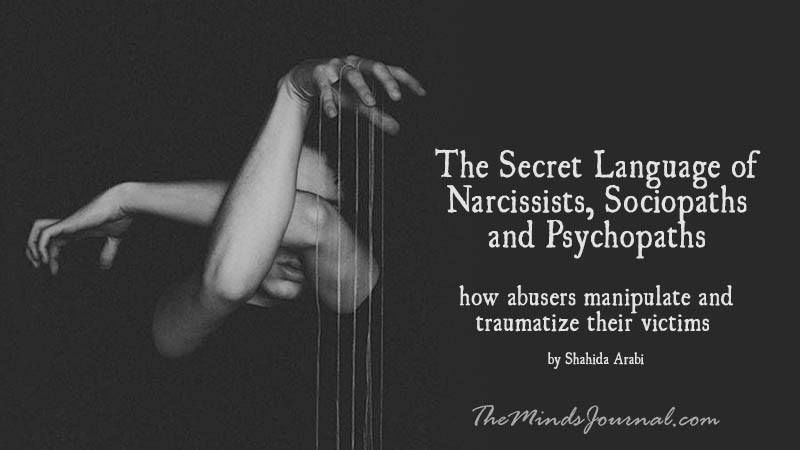 Therefore, expecting unconditional love from the partner, which was not received from the mother, the “border guard” himself implements the strategy of avoidance and is not capable of equal love.
Therefore, expecting unconditional love from the partner, which was not received from the mother, the “border guard” himself implements the strategy of avoidance and is not capable of equal love.
Childhood trauma
Mothers with BPD are a separate problem. Such women, as a rule, give birth out of fear of loneliness, for the sake of "a glass of water in old age" - i.e. guaranteed love. The attitude towards the child's father can suddenly and for no reason change from violent passion to complete denial and hatred (subsequently, this attitude is transferred to the child, breaking his self-esteem). And, although such an attitude towards men on the part of ex-wives is not uncommon, the main feature of the “border guard” is idealization with subsequent depreciation of the partner.
Such mothers are extremely difficult to please, because their mood changes several times a day, and the destroyed self-esteem of their children is not the only negative consequence of such relationships. “Such a child was punished for being a child. And in order to (psychologically) survive, he had to sacrifice his identity, his true self, in order to maintain attachment. Therefore, now love and intimacy are forever associated with the risk of losing oneself through absorption or abandonment,” writes psychologist, gestalt therapist Tatyana Martynenko. At the same time, the "border guards", according to her, perfectly test reality, are super-sensitive to the field, accurately read the emotions and moods of others.
“Such a child was punished for being a child. And in order to (psychologically) survive, he had to sacrifice his identity, his true self, in order to maintain attachment. Therefore, now love and intimacy are forever associated with the risk of losing oneself through absorption or abandonment,” writes psychologist, gestalt therapist Tatyana Martynenko. At the same time, the "border guards", according to her, perfectly test reality, are super-sensitive to the field, accurately read the emotions and moods of others.
Ekaterina Tarasova, for her part, notes: “border guards” are very sensitive to the world around them and are able to subtly feel and experience strong emotions. At the same time, the researchers note, since in the view of such a child the world was unsafe, and his interests and personality were not taken into account, this, as it were, gave him permission to "crack" the boundaries of other people.
And psychologist, Gestalt therapist Gennady Maleichuk explains the rejection by the "border guards" of parts of their own "I" by the fact that in childhood they did not have an understanding, supportive adult, "containing chaotic, uncontrollable emotionality, which led to a pathological splitting of experience and in as a result, to the non-inclusion in the image of the "I" of some unacceptable, unworthy from the point of view of the parents of feelings, inclinations and qualities of the "I". As a result, most of the territory of the "I" turns out to be alienated, consisting of separate, poorly realized fragments, not integrated into a single whole. The same attitude is transferred to others - "ours" will be idealized, "strangers" will be depreciated.
As a result, most of the territory of the "I" turns out to be alienated, consisting of separate, poorly realized fragments, not integrated into a single whole. The same attitude is transferred to others - "ours" will be idealized, "strangers" will be depreciated.
Practically all experts note the difficulties of working with such patients. According to Natalia Stilson, in this sense, “border guards” are even more difficult than narcissists: they have at least an inflated unstable self-esteem, which they fiercely defend, while “border guards” have no self-esteem at all. Rather, these are constant dizzying tricks from plus to minus: the “border guard” either grows beautiful gardens or burns everything with napalm.
Narcissistic and borderline personality disorder. Narcissistic Abuse
I do not agree with all the points, but the article is useful.
Help for people suffering from narcissistic abuse.
Translation of Melanie Tony Evans's book "Processes necessary for recovery from narcissistic abuse" ". Any comments write in the comments.
Any comments write in the comments.
Retrieved from www.melanietoniaevans.com
Hello, my name is Melanie Tonya Evans and as a result of my personal journey and absolute delight in the privilege of helping victims of narcissistic abuse around the world. I would like to present this post to you. Unfortunately, due to the worldwide epidemic of narcissistic abuse, the information in this e-book is an absolute must-read.
The reason I am so enthusiastic about alleviating your suffering and healing you from narcissistic abuse is because a few years ago I was the victim of an extremely narcissistic love relationship. I spent years in a completely destroyed and powerless state, and the worst thing is that I was very close to ending my life because of the abuse against me.
Looking back, I realize that I was in a completely different world. I feel full of energy, happy, secure and I love life again. I also have an amazing boyfriend and a career and environment that reflects who I want to be. Narcissism is no longer a reality in my world.
Narcissism is no longer a reality in my world.
And as a result, I am totally passionate about helping you get where I am.
Since I discovered the truth about narcissism and its destructive effect on its victims, I have been fascinated by this phenomenon for a very long time and I am convinced that narcissism is the main cause of victim abuse.
What is most striking is that people who have been abused by narcissists all say the same thing. I am sure that (if narcissistic abuse applies to you) as you read this book, you will find that the details described are incredibly accurate and eerily similar.
The "answers" about narcissistic abuse were a huge relief to me and they completely "came out from under the veil". The first time I was diagnosed with narcissism was in the middle of heartbreaking breakups and rekindling with my narcissistic ex-partner. I was sitting on the couch in a rented apartment (another "evacuation" in an attempt to fix things from a distance) and the word "narcissist" appeared in my head from literally nowhere.
I went to my computer and started searching for a word. I read the description of narcissism and my mouth dropped open in amazement. Immediately, I suspected the worst - my ex-partner is a narcissist. After several hours of reading, I was convinced that he was a narcissist. The puzzle has been completed.
However, no understatement how many times I have read that there is no "cure" for narcissism. I was determined to find a way. Of course, because love conquers all. Of course, because I can take him to a psychologist or find another way to help him, there was hope. Of course, because I can build an ideal relationship from scratch, I "knew" that it should be so.
Despite understanding what narcissism is and learning everything that could be found about it, even after seeing a personality disorder specialist who gave me clear hints to run away, I resisted until I was completely defeated.
You see, I was strong, determined, I could always achieve anything in my life if I wanted to. I didn't want to admit defeat under any circumstances.
I didn't want to admit defeat under any circumstances.
Even though I knew a lot about narcissists and the harm they cause, I still didn't realize at the time that my attempts to change and fix him were an excellent source of fueling narcissism for him (my attention). The more I remained attached to him, the more he fed his narcissism, and my personality became less and less until only a shell remained.
I thought I was a loving partner and his support, but in reality I offered myself as a "victim". But how could I know and understand what was really happening when my view of what was happening was through the "lens of humanity"?
I was not at a level where I could accept the real understanding and manifestation of narcissism which meant that he was not interested in solutions, cures, achievements in changing the situation for the better or solving problems. He was not interested in the topics that we discussed, my feelings about unfair moments on his part, lack of his support, manipulation and lies.
He was only interested in feeding attention - it didn't matter if it was good or bad. For an understanding of the tendencies of narcissism versus humanity, you can read my book How and Why to Do 'No Contact' When Narcissistically on my page www.melanietoniaevans.com (this book is part of the recovery program after narcissistic abuse).
Just like many people with whom I communicated, I was caught in the "illusion" that this is "the person I dreamed of all my life", however, everything I thought about in reality turned into the most nightmare.
However, instead of paying attention to myself, I stubbornly clung to the version of the man that I wanted to see and did not want to understand that he was different. As a result, I was attached to him much longer than I should have been (which is a common manifestation of narcissistic abuse), I suffered a complete psychological and suicidal breakdown. I tried to love and fix the person who was tearing my life and soul apart piece by piece all the time.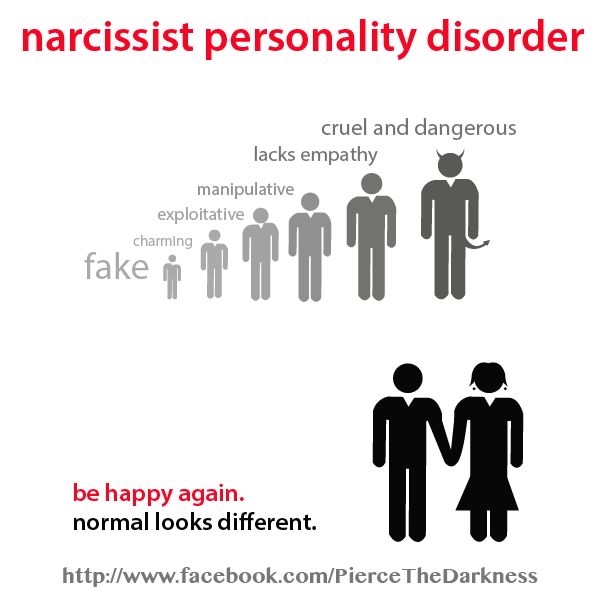
When I "broke down", I was depressed, I developed a fear of open space and a complex post-traumatic syndrome, and, describing the moment when I broke down, I absolutely clearly saw myself "drenched in my own blood." I saw my own image stood before my eyes and I could not get rid of it. I remember my thoughts - "it's clear, that's how they lose their minds."
I suffered severe psychological, physical, emotional, financial and sexual abuse in my quest to mend relationships, and I kept coming back for more. I believed that I would be the first person on the planet to heal a deep narcissist. I believed that it was my responsibility and that our relationship was not fully disclosed and that I should heal him.
As a result, I had to be treated for a severe psychosis - I was close to trying to kill myself. I was prescribed complete rest and anti-psychotic drugs. Something in me knew that if I went through the usual path of treatment I would never recover and I would never live the life I wanted to.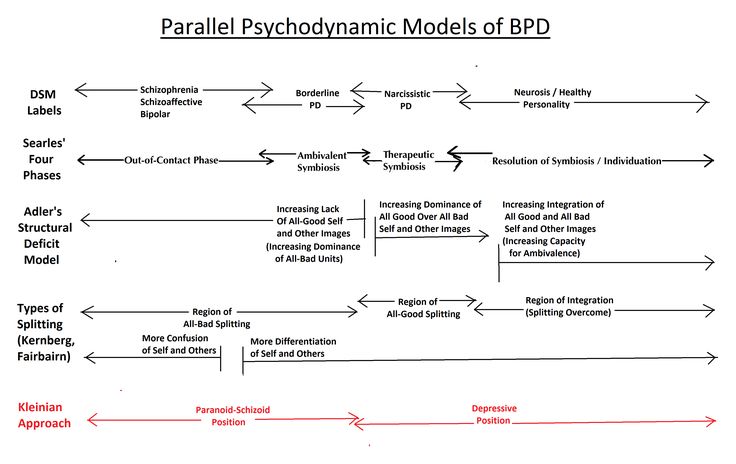 After the Valium injection, the traumatic shock disappeared and I began to behave "normally". My condition was described as stable and allowed to be taken home under observation. I was told to come back the next day and continue the treatment.
After the Valium injection, the traumatic shock disappeared and I began to behave "normally". My condition was described as stable and allowed to be taken home under observation. I was told to come back the next day and continue the treatment.
I remember the drive home and the thoughts running through my head. I did not know what to do except to go the way of treating injections with drugs. In addition to the fear of a recurrence of psychosis, my adrenaline-releasing system was overactive and as a result was a serious threat to my health. I needed to stabilize my health and emotions, but I was afraid to turn into a "zombie". I felt hopeless and did not know how to get out of this state.
When I got home, I collapsed on the bath mat, raised my hands in the air, and, through streams of tears, begged the universe "I can't do this alone
The information I share with you in this book is rather my personal history and the procedures I went through to save and restore myself to become competent to create real life, love, success and enjoyment of life. And one of my biggest desires is to inspire you to do the same.
And one of my biggest desires is to inspire you to do the same.
Work on oneself
Work on oneself is needed by women in men who suffer from narcissistic abuse or from the consequences of narcissistic / violent relationships. Although my book is specifically for people who have suffered from narcissistic love relationships, the information and processes are also suitable for any person who suffers from a narcissistic relationship with a parent, relative, or other important person in their life.
Work on yourself is also very necessary if, as a result of a violent relationship, you are still alone and feel empty and disappointed and afraid to create a new relationship. It is important to deal with your past before you try to move forward. Many of us take a more difficult path, otherwise we are very much at risk of experiencing the same pain again.
You may even have formed a relationship with a healthy partner, but the demons of the past create fears and undermine the relationship. You run the risk of losing the "good" if your relationship is not built with an eye to those things that manifest from your past into your present circumstances
You run the risk of losing the "good" if your relationship is not built with an eye to those things that manifest from your past into your present circumstances
I believe that when you read about the processes needed to recover from narcissistic abuse, you yourself will begin to understand what you need to do to get your life back - and you will become much more competent in understanding these processes than you could imagine.
Law of Attraction
This is true of all of us - and especially those who are "broken" - we are waiting for someone to "give us himself" - we are very vulnerable because of this. Why? Because we cannot control anyone but ourselves. We cannot force someone to behave in a certain way in order for those people to give us the life we want. Counting on the fact that these people will make us happy, we give up our own capabilities and strengths and become powerless.
I know it's like a sudden awakening. All the same, our normal human views say that they should! But it's not something we see every time, no matter how much they have to, no matter how hard we try to make it happen, they either don't want to or can't, it won't happen.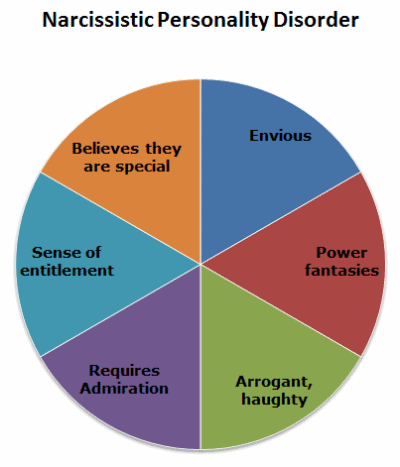
Why do we stubbornly try to do this? Why don't we understand, as in the case of a machine or a computer, it doesn't work, it hurts me. It doesn't work out with this person - well, it's time to find someone with whom it will work out...
We may ask that we don't evaluate relationships in this way because logically we can take a different computer and get there by a different route than by car, but when we realize that the relationship has inevitably run its course we can't just take a change of partner the next day . And even if we do this, there is no guarantee that it will work and solve our relationship problems.
Perhaps the lesson is that we should not be stubbornly attached to existing relationships because it is not easy to replace them with others. Maybe our relationship is not some external addition to our life. Maybe they are a continuation of a relationship with themselves. Maybe the right solution is to create ourselves
Unfortunately the "problem" cannot be solved by finding someone from outside to give "what I need in life". Therefore, this means that the solution to the "problem" must appear within us.
Therefore, this means that the solution to the "problem" must appear within us.
The Law of Attraction is very precise and incredibly absolute. And it says: no one can give us what we cannot give ourselves.
Based on the law of attraction and quantum physics, the indisputable proof is ‘as within, so without’. Therefore, I deeply believe that you do not yet know that you deserve to be "full", happy and strong - and no one else can give you these values.
The funny thing is that when you start creating yourself with all your heart, you naturally start to attract "like". Then you begin to follow this path and achieve real results. Nobody can give you "themselves", they can only add to "you". When you create yourself, "adding to you" will become an attachment to you.
"Creating yourself" can seem like really hard work. But the truth is that the much harder work is NOT to create yourself... I have learned this deeply from my own experience. I also realized that having created myself and embarked on the life path of "full self" love is literally "easy" and "natural". Instead of being an endless struggle, it becomes light and gives strength and freedom to create, instead of constantly exposing past wounds.
Instead of being an endless struggle, it becomes light and gives strength and freedom to create, instead of constantly exposing past wounds.
As you read, I will try to explain this to you as best as I can so that it can become your life.
Part of the healing process. Education
The first and necessary part of the process of healing from narcissistic abuse is education about what narcissism is, the tendencies of the narcissist, and YOUR tendencies in dealing with the narcissist. Your understanding of the facts of narcissism is essential.
Understanding narcissism.
Narcissism is a serious personality disorder in which an individual seeks to fuel narcissism (attention, energy, other values) at the expense of others.
There are two types of narcissism:
- Healthy narcissism in which the individual tries to make sure that his needs are met, trying to win in different situations, but without intentionally harming others.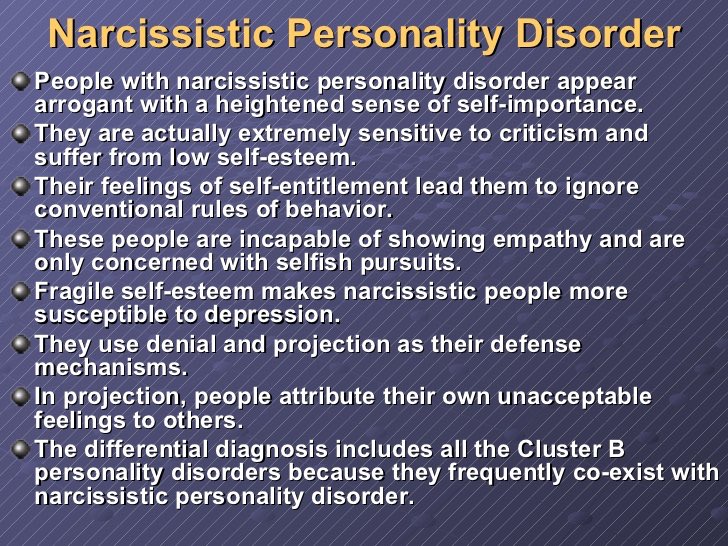 This is the point of view of the "majority", all beings deserve good things, "I can achieve and find happiness and I am happy that other people in my life get good things."
This is the point of view of the "majority", all beings deserve good things, "I can achieve and find happiness and I am happy that other people in my life get good things."
Determine if you have a love addiction and find out what steps are needed to break out of it and break the circles of pain.
Introduction
Society pays attention to chemical and gambling addictions. Dependence on love relationships - no. Addictions are based on emotions. Is there anything more emotionally all-consuming than a love relationship?
It is well known that serious addictions can kill a person or ruin a life. Dependence on love relationships can lead to death and destruction, tearing apart love for oneself, life and connection with everything in our world. (Quote from the back cover of Breaking the Chains of Painful Love.)
What does "addiction" mean?
Addiction is a habit of something necessary for a normal existence. If you remove the object of dependence, then the person will experience the shock of rejection (withdrawal syndrome). Addiction, in its advanced stages, creates a manic level of constant desire to return to the source of the addiction despite the devastating consequences for the mental, emotional, physical or financial condition.
Addiction, in its advanced stages, creates a manic level of constant desire to return to the source of the addiction despite the devastating consequences for the mental, emotional, physical or financial condition.
Any addiction is serious.
Addiction to love relationships is deadly serious.
Women are more genetically predisposed to fall into a state of love addiction. They have a tendency to uplift their partners more quickly and see them as a source of happiness. Such women did not work for their personality and created their own sense and understanding of personal support and strength.
Also, women are more likely to fall into the hands of a narcissistic partner and stay with him allowing self-understanding and sense of self to be destroyed, leading to a serious state of dependence on love relationships - often in addition to the consequences of severe psychological abuse.
It is unlikely that addiction to love relationships will last very long, as it will not be allowed by at least one of the emotionally healthy partners who are healthy enough to maintain a successful relationship. Typically, the partners involved have attracted each other as a result of unresolved emotional fears.
Typically, the partners involved have attracted each other as a result of unresolved emotional fears.
Please note that although these features are characteristic of a dependent woman, they are also characteristic of men.
How to identify that you are suffering from a love addiction:
- Your days are based on "what he does, says or thinks"
- You have lost interest in friends and personal goals
- You plan your life to fit his life
- You accept what he wants even if you disagree
- You start to become one and get involved in things you never thought you would be involved in
- You often feel anxious, depressed and confused
- Your life in general can be described as suffering
- You crave his attention, but that's all for you time lacks that attention, even if you feel anxious, frustrated, or abused in his company
- You are horrified if he hangs up or leaves
- If he shows a loss of interest in you - you panic
- No matter how he treats you, you cannot leave
- You admit mistakes or give in even if you are not comfortable with this maintain a normal relationship
- You feel a strong emotional and mental decline if the relationship breaks off
- You cannot stop contacting him
- Your behavior is out of your control
Obsessed love is unresolved emotional problems
Love addiction is not healthy love. It's a craze. It misleads a lot of people because they feel it very strongly and think "This must be love!" No, this is not love - this is an onslaught of chemical peptides (hormones) that are driven into your body and a deep subconscious behavioral model of self-flagellation that is looking for a way out of your soul. It is your body's way of bringing past traumas out again in order to become aware of them and heal them.
It's a craze. It misleads a lot of people because they feel it very strongly and think "This must be love!" No, this is not love - this is an onslaught of chemical peptides (hormones) that are driven into your body and a deep subconscious behavioral model of self-flagellation that is looking for a way out of your soul. It is your body's way of bringing past traumas out again in order to become aware of them and heal them.
People who are addicted to love often have unresolved childhood problems that create a strong attraction in unhealthy relationships. Typically (subconsciously) the person tries to resolve unresolved childhood emotional issues by pulling the person causing the trauma (such as abandonment, mistrust, abuse) to bring them back to the surface from childhood.
The overall picture is this is a great system to heal what hasn't been healed yet - but if we don't become aware of this system old wounds are reopened and the pain is terrible with no end in sight.
Cure from obsessed love
Cure is vital.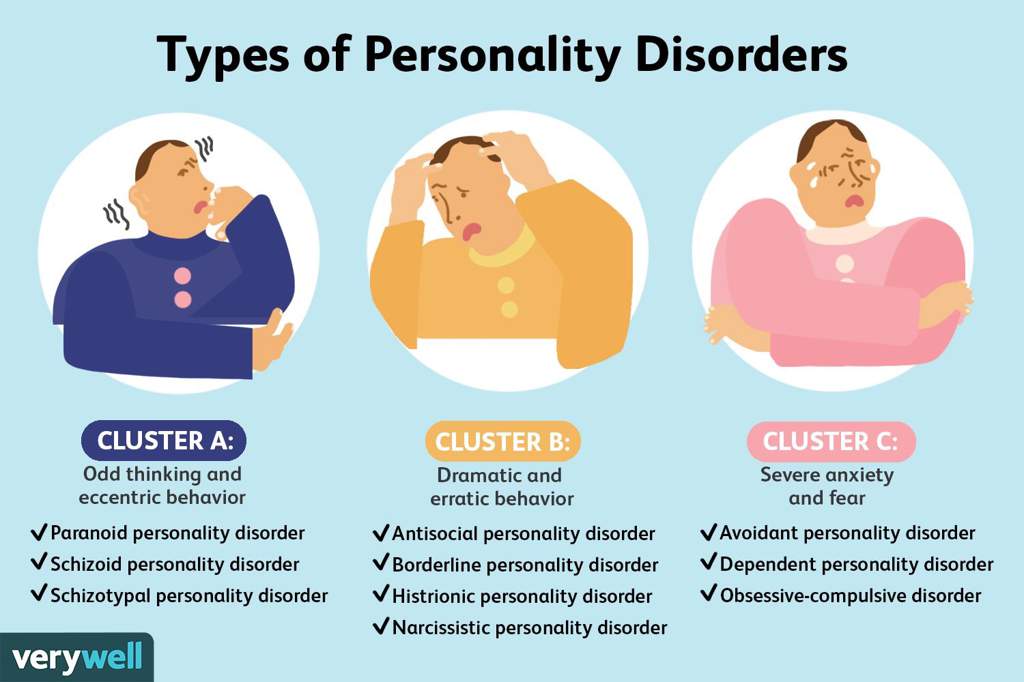 Love addiction leads to complete stupor and even death if it is not stopped - imprisonment, murder, suicide or death from an incurable disease, a fatal incident.
Love addiction leads to complete stupor and even death if it is not stopped - imprisonment, murder, suicide or death from an incurable disease, a fatal incident.
Recovery steps:
- Recognizing that you are addicted and in need of help
- Pull yourself out of the source of addiction and make structured plans to get yourself back
These plans could be:
- Recovery system
- Counseling and group support created to overcome love addiction
- Reading the right books
Goal in work:
- Restoring self-respect
- Developing your strength, interests and personal goals
- Finding and treating the emotional problems that got you into painful, abusive, and dependent relationships
- Developing a healthy belief system, a healthy understanding of personal boundaries, and a healthy love and respect for yourself to eliminate the need to attract or maintain painful, abusive, and dependent relationships.
If you are broken as a result of love addiction, the need to break free and take the first steps can be terrifying.